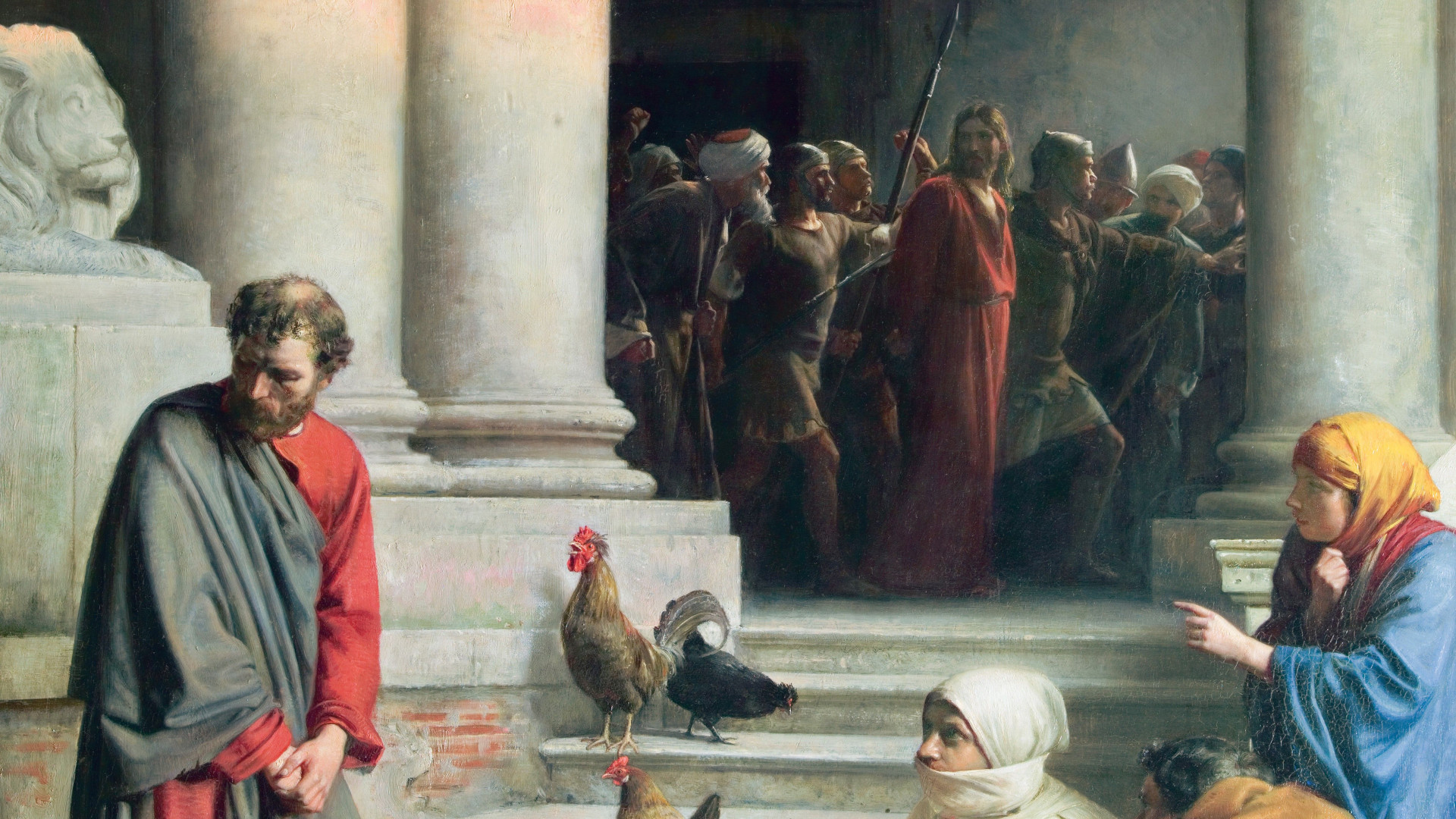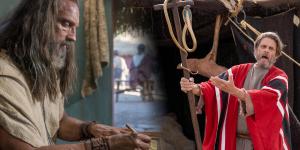You are here
Why Did Peter Deny Knowing Jesus?

Matthew 26:34
The Know
Following the institution of the sacrament in the upper room at the Last Supper, Jesus offered several final instructions to His disciples. While John devotes the most time and attention to these final, intimate moments of Christ’s life, all four Gospels agree on one aspect of these final instructions: Jesus solemnly told His disciples that he would be seemingly abandoned that night by these chosen Apostles, including Peter.1 “All ye shall be offended because of me this night,” the Savior told them, “for it is written, I will smite the shepherd, and the sheep of the flock shall be scattered abroad” (Matthew 26:31).
Peter, clearly distraught at the prospect, exclaimed in response, “Though all men shall be offended because of thee, yet will I never be offended” (Matthew 26:33), and John records him giving an even stronger response: “I will lay down my life for thy sake” (John 13:37). However, Jesus replied that even Peter would deny Him three times before the night had ended.2
This prophecy can be interpreted in many ways, as can the reason why Peter would have denied Jesus in such a crucial hour. Specifically, some Latter-day Saint commentators have wondered whether Jesus was issuing a command to Peter.3 Eric D. Huntsman has explored this event as it is portrayed in all four Gospels, offering significant insights into what could have occurred on that fateful night.
All four Gospels use a form of the verb arneomai, meaning “repudiate, disown, or disclaim association with someone or something.”4 Only Matthew and Mark use a future tense of this verb, which has led to the most ambiguity over whether or not Jesus was issuing a command to Peter.5 However, as Huntsman observes, this verb is used here in a “future deponent indicative form,” which means “that Jesus was foreseeing or prophesying what Peter would do.”6 While later Greek texts could use this verb form as a command, such a usage is rare in the New Testament.7 Huntsman observes that “the immediate context of Jesus’ pronouncement … favors a prediction over a command” since it was preceded by Jesus’s quotation of Zechariah 13 and His statement that this prophecy would be fulfilled.8
Furthermore, “neither the Lucan nor the Johannine accounts allow the verb [for ‘deny’] to be a future” command in the earliest Greek manuscripts,9 rendering the statement as “the cock will not crow this day, until you have denied three times that you know me” (Luke 22:34 NRSV). The emphasis for Jesus’s future statement is on the rooster crowing. Thus, Luke and John appear to classify Jesus’s statement as a prediction rather than a command, giving Peter a future sign (the rooster’s crow) whereby he may know that what Jesus said would be fulfilled.10 Strengthening this prophetic interpretation, Luke’s account adds an interesting detail wherein Jesus first prays for Peter and tells him, “When thou art converted, strengthen thy brethren” (Luke 22:32). However, the word translated in the King James Version as “converted” literally means “to turn back again.”11 The instruction thus implies that Peter will repent in the near future.
Ultimately, as Peter watched the trial later that night, he would deny knowing Jesus three times, just as Jesus had said. However, as President Spencer W. Kimball observed, “Peter never denied the divinity of Christ. He only denied his association or acquaintance with the Christ, which is quite a different matter.”12 Regardless of the circumstances, Peter was nonetheless saddened by his actions as soon as he heard the cock crow: “And Peter remembered the word of Jesus, which said unto him, Before the cock crow, thou shalt deny me thrice. And he went out, and wept bitterly” (Matthew 26:75).
Regardless of whether or not Jesus originally intended to relay a command to Peter or simply offer a prophetic statement, Peter had no business being outside of Caiaphas’s palace in the late hours of this night. He had already made one mistake by cutting off the ear of the chief priest’s servant. It would not be a stretch to assume that he must have been very nervous and insecure and so may not have been thinking very clearly. Thus, John W. Welch notes that “Peter’s reaction by the fire was probably not deliberate. He was truly sorry and wept bitterly over the situation, and he realized that all of Jesus’s prophecies would come true.”13 This undoubtedly included Jesus’s many predictions of His coming crucifixion. Those were prophecies that Peter and the other Apostles had a very hard time initially believing could, should, or would happen to their beloved Savior.14 In such a strenuous moment, it would be understandable for Peter to say what he did and also to have expressed such deep sorrow and regret.
However, that is not the end of Peter’s story. Peter, chosen to be the chief Apostle, would grow from this experience. In fulfilment of Jesus’s desire that when Peter had “returned back,” he took seriously the charge to “strengthen [his] brethren” (Luke 22:32, BYU New Rendition).15 As one of the earliest witnesses to the resurrected Christ, Peter would testify of Jesus’s salvific mission in boldness, humility, and love for the remainder of his days.
Soon after Jesus’s Resurrection, Peter likewise showed his complete repentance, expressing his love for the Savior three times (see John 21:15–17). Then, back in Jerusalem, Peter and John publicly healed a man “in the name of Jesus Christ of Nazareth” on the eastern steps leading up to the temple (Acts 3:6). For that, Peter and John were taken before the Sanhedrin, where they boldly testified of Christ, withstood imprisonment, and were delivered (see Acts 4). Afterward, they never again flinched to testify openly and unequivocally of the Resurrection of the Lord Jesus Christ.
President Kimball made the following observation regarding the character of Peter in light of this incident: “I do not pretend to know what Peter’s mental reactions were nor what compelled him to say what he did that terrible night. But in light of his proven bravery, courage, great devotion, and limitless love for the Master, could we not give him the benefit of the doubt and at least forgive him as his Savior seems to have done so fully?”16
The Why
We likely will never know the full details of the terrible night when Jesus was tried and found guilty of death. We will likely never know the full breadth of dangers faced by each of Jesus’s disciples, especially those who had followed Jesus so close to the house of Jesus’s most embittered enemies. However, we can know how deep the love that Jesus and Peter had for one another was.
Peter’s faith and priesthood power cannot be denied. “Peter was a man of faith,” President Kimball observed. “He healed the sick by their merely passing through his shadow. Prison walls could not hold him. Because of him, the dead came back to life. He walked upon the water.”17 Soon after Jesus’s Resurrection and forgiveness of Peter, Peter was boldly preaching in the temple on the day of Pentecost and healing the sick, and he was also imprisoned for preaching that Jesus was resurrected (see Acts 2–3).
“What should perhaps be the greatest lesson drawn from the denial stories is that Peter, like all of us, could make mistakes, but through Jesus Christ he could be fully redeemed, rehabilitated, and able to serve faithfully,” Huntsman observed.18 Although we will not necessarily be placed in such a dangerous circumstance as was Peter, we can gain strength from this account of mortal weakness and complete repentance. We can likewise gain confidence as we face our own private struggles and seek to stay true to our baptismal covenants “to stand as witnesses of God at all times and in all things, and in all places that ye may be in, even until death, that ye may be redeemed of God” (Mosiah 18:9).
From all this, Peter learned that treading cautiously or trying to be unnoticed as a follower of Christ was not an option. As John W. Welch asks, “How often do we deny Christ in our lives by saying less than we know and less than we should? … We should never shy away from opportunities to be a witness for Christ. And we must be on guard, for, as may be said, we are closest to sin when we think we are farthest from it.”19 Just as Peter stood as a strong witness of Christ for the remainder of his days following this event, we can be witnesses of Christ in all circumstances we may be found in, gaining strength through Peter’s example of continually relying on Jesus’s love and Atonement.
Further Reading
Eric D. Huntsman, “The Accounts of Peter’s Denial: Understanding the Texts and Motifs,” in The Ministry of Peter, the Chief Apostle, ed. Frank F. Judd Jr., Eric D. Huntsman, and Shon D. Hopkin (Provo, UT: Religious Studies Center, Brigham Young University; Salt Lake City, UT: Deseret Book, 2014), 127–149.
Spencer W. Kimball, “Peter, My Brother,” in Ministry of Peter, 375–386; originally in Speeches of the Year (Provo, UT: Brigham Young University Press, 1971), 1–8.
John W. Welch, “Matthew 26–28,” in New Testament Minute: Matthew (Springville, UT: Scripture Central, 2023).
S. Kent Brown, “Luke Chapter 22,” in Testimony of Luke (Provo, UT: BYU Studies, 2014), 973–1050.
- 1. See Matthew 26:31–35; cf. Mark 14:27–31; Luke 22:31–34; John 13:33–38.
- 2. See Matthew 26:34; Mark 14:30; Luke 22:34; John 16:38.
- 3. For the view that Jesus was issuing a command to Peter, see John F. Hall, New Testament Witnesses for Christ: Peter, John, James, and Paul (American Fork, UT: Covenant Communications, 2002), 65–66; Andrew C. Skinner, “The Arrest, Trial, and Crucifixion,” in Studies in Scripture, vol. 5 of 8, The Four Gospels, ed. Kent P. Jackson and Robert L. Millet (Salt Lake City, UT: Deseret Book, 1986), 441–442; Andrew C. Skinner, “Peter—the Chief Apostle,” in Go Ye into All the World: Messages of the New Testament Apostles, ed. Ray L. Huntington, Thomas A. Wayment, and Jerome M. Perkins (Salt Lake City, UT: Deseret Book, 2002), 208–213; Andrew C. Skinner, Golgotha (Salt Lake City, UT: Deseret Book, 2003), 54–59. Many of these appear to be inspired by a 1971 BYU devotional given by President Spencer W. Kimball; however, as noted by Frank F. Judd Jr., Eric D. Huntsman, and Shon D. Hopkin in an introductory note to a reprint of this address, “nowhere in this address does President Kimball directly suggest that the Savior himself commanded Peter to deny knowing him, although some seem to have deduced that from references to Jesus’ directing Peter not to tell anyone that he was the Christ and his prohibiting Peter from trying to keep him from being crucified. … Nevertheless, President Kimball makes it clear that we should be hesitant to judge the chief Apostle and should instead focus on how such experiences focused and refined Peter, seeing them in the greater context of the great things that Peter went on to do after the Savior’s Crucifixion and Resurrection.” Introductory remarks to Spencer W. Kimball, “Peter, My Brother,” in The Ministry of Peter, the Chief Apostle, ed. Frank F. Judd Jr., Eric D. Huntsman, and Shon D. Hopkin (Provo, UT: Religious Studies Center, Brigham Young University; Salt Lake City, UT: Deseret Book, 2014), 376.
- 4. Eric D. Huntsman, “The Accounts of Peter’s Denial: Understanding the Texts and Motifs,” in Ministry of Peter, 133.
- 5. While Jesus would have originally spoken in Aramaic, which has only one verb form for both commands and prophetic utterances, studying the Greek text can gives insight into “what the evangelists (or their sources) thought Jesus meant or intended when he originally spoke in Aramaic.” Huntsman, “Accounts of Peter’s Denial,” 136.
- 6. Huntsman, “Accounts of Peter’s Denial,” 134.
- 7. Huntsman, “Accounts of Peter’s Denial,” 135, notes that when this verb form is used as a command in the New Testament, “it is usually quoting the LXX [Greek Septuagint] or otherwise imitating the legal language of the Old Testament.”
- 8. Huntsman, “Accounts of Peter’s Denial,” 136.
- 9. Huntsman, “Accounts of Peter’s Denial,” 135. While the King James translation of John 13:38 uses a past tense verb, it erroneously translates the verb in Luke 22:34 as a future tense verb. However, this reading is reflected in modern translations of the Bible such as the New Revised Standard Version and English Standard Version, which had access to more of these early manuscripts than the translators of the King James Version.
- 10. See S. Kent Brown, “Luke Chapter 22,” in The Testimony of Luke (Provo, UT: BYU Studies, 2014), 1012–1013.
- 11. Huntsman, “Accounts of Peter’s Denial,” 131; Brown, “Luke Chapter 22,” 1011. The BYU New Rendition (as well as other modern translations of the Bible) renders this verb more literally: “And when you have returned back, strengthen your brethren.” Brown, “Luke Chapter 22,” 1009, 1011.
- 12. Kimball, “Peter, My Brother,” 378.
- 13. John W. Welch, “Matthew 26–28,” in New Testament Minute: Matthew (Springville, UT: Scripture Central, 2023), 12.
- 14. See, for example, Matthew 16:21–23; 17:22–23; 20:17–19, Mark 8:31–32; 9:30–32; 10:32–34; 9:21–22, 43–45; 18:31–34. Even though Jesus had likewise prophesied of His Resurrection in connection with His death, it was only after the Apostles had seen the resurrected Christ that they began to fully understand all that had been said to them. See Luke 24:44–48.
- 15. Brown, “Luke Chapter 22,” 1009.
- 16. Kimball, “Peter, My Brother,” 381.
- 17. Kimball, “Peter, My Brother,” 383.
- 18. Huntsman, “Accounts of Peter’s Denial,” 142.
- 19. Welch, “Matthew 26–28,” 12.
KnoWhy Citation
Related KnoWhys
Subscribe
Get the latest updates on Book of Mormon topics and research for free





